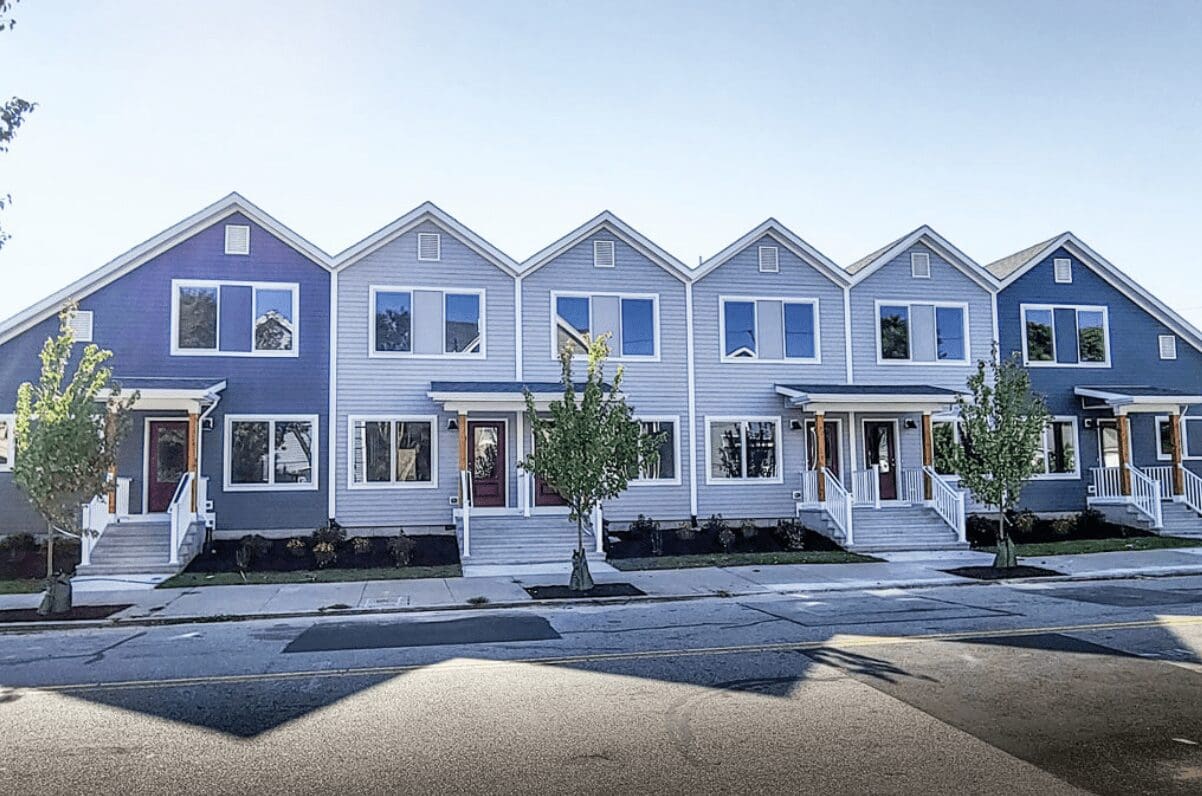Search Posts
Recent Posts
- Dr. Rosemary Costigan Named President of Community College of Rhode Island June 19, 2025
- RI Veterans: Did you know? 19.06.25 (Military Funerals, Job Fair, Benefits, Events) – John A. Cianci June 19, 2025
- East Providence First in U.S. to Equip All Firefighters with PFAS-free Gear June 19, 2025
- We Cook! Mill’s Tavern Saffron Bouillabaisse with Tarhana Lobster Jus June 19, 2025
- Rhode Island Weather for June 19, 2025 – Jack Donnelly June 19, 2025
Categories
Subscribe!
Thanks for subscribing! Please check your email for further instructions.

Common ground on the road to shelter for those in need – Richard Asinof
by Richard Asinof, ConvergenceRI
Photo: Bowdoin Street Rowhouse, ONE|Neighborhood Builder’s newly completed multifamily rental development in Olneyville
(Editor’s Note: This follows a meeting ConvergenceRI has been following of “tense negotiations between Gov. McKee, Neil Steinberg, president and CEO of the Rhode Island Foundation, Eric Hirsch, Ph.D., Interim Director, Black Studies Program at Providence College, Josh Saal, the Rhode Island Secretary of Housing, and leaders from nine community agencies and providers. The negotiations culminated in a Wednesday, Sept. 21, session at the State House.” – We pick it up there…)
The meeting with the Gov. Dan McKee on Wednesday, Sept. 21, apparently did not go well, according to a number of participants.
As one participant described the aftermath:
• That was not what we needed from the Governor. He appears to have retreated from his pledge to offer shelter to the people who are outside. He was still focused on the dollars they have already spent on this – and not on the siting and up-front money that we needed to solve the problem.
Yet, in the week that followed the Sept. 21 meeting, progress appeared to have been made, with the investment of $3.5 million in new shelter space, with more aid promised.
ConvergenceRI reached out to R.I. Secretary of Housing Josh Saal, to get his take on the meeting and its aftermath, beginning with Saal’s willingness to confirm that he had been part of a meeting with the Governor and community advocates at the State House on Wednesday, Sept. 21.
Here is the question-and-answer with Saal, prepared with the help of Chris Raia of Duffy & Shanley, working as a consultant with Saal.
ConvergenceRI: First, I wanted to confirm that you were attended a meeting on Wednesday, Sept. 21, with Gov. McKee, Neil Steinberg, and a number of housing advocates to discuss a plan to address the growing need for housing, focused on those Rhode Islanders without permanent housing; is that accurate?
SAAL: Yes, I attended this meeting on Wednesday, Sept. 21. My office routinely meets with elected leaders, housing advocates and other community stakeholders, and we look forward to continue working with these groups.
ConvergenceRI: Second, I wanted to confirm that there was no consensus reached on a plan to move forward; is that accurate? If not, please explain what was agreed upon?
SAAL: I don’t agree with that interpretation. This was a productive meeting that resulted in key insight from the state’s leading housing and homelessness experts.
Rhode Island is fortunate to have a deep, diverse group of individuals and organizations who are passionately committed to building a stronger, more accessible and more sustainable statewide housing future for all Rhode Islanders, including people experiencing homelessness.
We’re not going to agree on every issue every time we meet, but it is critical that we continue to come together as a group to share opinions and best practices.
ConvergenceRI: Third, from the Governor’s [and your] perspective, there was concern voiced about what were the results of the previous investments that had been made? Is that accurate?
SAAL: While I do not know to which specific investments you are referring, I will say my office is pleased with the progress Rhode Island has been able to make in the last year.
We’ve broken ground on multiple new housing developments in priority areas across the state; successfully grown the statewide Landlord Incentive Program to help more than 100 households secure permanent housing; significantly increased the state’s shelter capacity ahead of the winter months; and started the process of funding and standing up critical programs such as Medical Respite, Recovery Housing and Legal Services that aim to prevent and functionally end homelessness by proactively addressing its root causes.
There is plenty of work left to do, and we’re looking forward to continuing this process and building on our early success.
ConvergenceRI: Fourth, is there another meeting planned?
SAAL: There will be several additional meetings planned this year, next year and the year after that. Addressing the housing issue is a full-time, year-round, always-on effort, and we’ve committed to working collaboratively with the state’s housing community on an ongoing basis.
ConvergenceRI: Fifth, moving forward, what are your biggest concerns?
SAAL: My office and the vast majority of the stakeholders we are communicating with share the same top concern: Rhode Island’s housing stock, in its current state, is not sustainable. The market does not have enough available housing units, and too many of the units that are on the market are outdated.
This is a pressing issue that is impacting individuals and families at every income level, living in every community in the state. Our goal is to develop and execute a comprehensive, statewide plan that focuses on building new housing units; fixing existing units; and stabilizing the market so that Rhode Islanders aren’t left behind.
A united approach
ConvergencegenceRi also reached out to Cortney Nicolato, the president and CEO of United Way of Rhode Island, to capture her insights into the ongoing affordable housing crisis and the efforts to create a unified, comprehensive approach to the growing number of Rhode Islanders who are “unhoused.” [Her answers were prepared with help from Michael Cerio.]
ConvergenceRI: What is the current crisis, as you understand it?
NICOLATO: Pre-pandemic we would average about 70 people unhoused every night. To be clear, that is 70 too many. However, we are now averaging 350-400 people every night
The unhoused crisis is a result of both our long-term housing shortage, the sun setting of programs like the eviction moratorium as well as Rent Relief RI, and the short-term effect of the pandemic, inflation, and energy prices.
The solution requires both immediate and sustained efforts to address the housing crisis. It is an important first step that the state announced today [Friday] that they are releasing funds to create additional shelter beds. Just as it was an important first step for the state to invest $250 million in housing last session. These are important first steps, but we can’t stop here.
ConvergenceRI: There is apparently one group of governmental folks who are questioning: what have you done with the money you have already received and why hasn’t that alleviated the problem? How would you respond to that criticism?
NICOLATO: We are not sure what money is being referenced. We can’t respond without knowing what you mean by ‘the money you have received.’ What funds are you referring to and who received them?
[Editor’s Note: At different times during the negotiations between community providers and the Governor’s team, questions had allegedly been raised, apparently by members of the Governor’s team, asking for “accountability” for money that had been previously invested. It was difficult for ConvergenceRI to be more specific without revealing sources, so the question to both Saal and Nicolato remained non-specific on purpose.]
ConvergenceRI:Where does “housing” rank on the number of calls being received by 211?
NICOLATO: Housing has been a top-five need for the entirety of 2022, with it sitting in the top spot consistently since April. Thus far we have had 62,314 housing needs [calls] in 2022. This includes mortgage assistance, rental, shelter, emergency housing and prevention, eviction assistance, housing locator, etc.
ConvergenceRI: Are Rhode Islanders suffering from what is sometimes characterized as compassion fatigue?
NICOLATO: No, quite the opposite. Rhode Islanders are deeply concerned, and compassionate, about the housing shortage in our state. We hear it from our supporters as do our partners in the nonprofit community. Rhode Islanders have a lot of compassion. What they want is sustained action and solutions.
___
To read more articles in RINewsToday by Richard Asinof, go to: https://rinewstoday.com/richard-asinof/

Richard Asinof is the founder and editor of ConvergenceRI, an online subscription newsletter offering news and analysis at the convergence of health, science, technology and innovation in Rhode Island.
